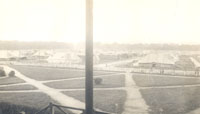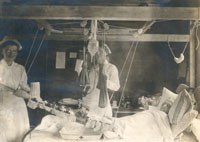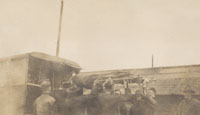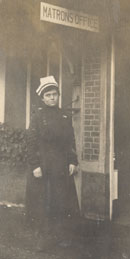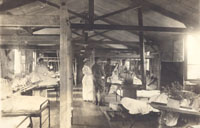In Her Words
“Recollections of a World War Nurse” by Retta L. Snyder
This series of articles was published in the early 1940s in the “Rouen Post,” the monthly newsletter of the American Legion Chapter known as Rouen Post No. 242. The chapter was made up former members of Base Hospital 21 and its successor, the 21st General Hospital, who served during World War I and II.
Retta L. Snyder, a Galesburg, Illinois native, was a nurse at St. Luke’s Hospital in St. Louis when she joined Base Hospital 21 in 1917. The first group of doctors, nurses, and enlisted men of Base Hospital 21 left St. Louis in May 1917 and were among the first Americans to establish an army hospital in France. A reinforcement group, including Snyder, left St. Louis in August 1917, joining the unit in Rouen, France in November (after a lengthy delay in New York).
These excerpts of Snyder’s memoirs describe some of her experiences as an army nurse.
I am in D line, a row of nine tents; four double tents and a single tent at the top. All rows of tents are called lines. I have the odd tent and the first double one. My patients are the in-betweens, not walking nor the very severely wounded. Kathryn Slaten has the other side of the double tent and her patients are severely wounded. The dressings are done by senior medical students and a dressing nurse and they do the work in five tents. With fourteen beds in a tent we have plenty to do. We do not treat the men like St. Luke’s patients, but I think we do very well considering the number we have. In the morning we go on duty at 7:40. The men have their a.m. face washing and the blue boys (up-patients) serve the breakfast which is usually porridge, tea and bread. One day I may have two or three, the next day a dozen for there is a constant coming and going. After the breakfast is finished I rub backs, brush out crumbs, straighten sheets – change the most soiled – and brush teeth when I have time. Kathryn Slaten and I are called the tooth-brush queens for we insist upon more tooth-brushing than the V.A.D.’s [Voluntary Aide Detachments] did. To be sure, many of the Tommies have few enough teeth to clean. They should have started the brushing generations ago.
Each patient has a bath when he comes in and once or twice a week as we have time. There are usually sixteen or eighteen patients to fix up in the morning. At ten and four the temperatures are taken and we try to serve nourishment between meals to the most anemic. In the afternoon we wash all faces and hands, rub backs and fix the beds again. Of course there are endless fomentations and turning and returnings of the sick ones. We must watch their backs and try to prevent pressure sores.
To visit and laugh with the men is as much a part of the work as the dressings and baths. On my half day last week I fixed up seventeen and gave three full baths before one o’clock. And a bath here means a cleansing bath, not a refreshing sponge, though it must be refreshing to the men to be free of Flanders mud. One usually takes three changes of water at least.
The beds are always messy because of the Carrel tubes. You have read of the Carrel-Dakin solution that does such wonderful work. It is an antiseptic that is syringed into the dressings every three or four hours. Small rubber tubes about ten to fifteen inches long are bandaged in with the dressings, leaving the ends free. We use a glass syringe with a rubber bulb and put a syringeful of Dakin into each tube. There are from one to ten tubes according to the wound. And the solution runs into the tube, through the tube into the dressings and through the dressings into the bed. No amount of rubber sheeting keeps it in. We simply change sheets as often as we can. But is surely is remarkable how those wounds heal.
We made allotments the other night. My Liberty Loan takes five dollars a month and I have arranged for thirty to be paid at home. That leaves me the munificent sum of twenty-five dollars a month. But the British Government sends a certain amount called a field allowance; that goes toward our laundry and mess and the remainder is divided among the nurses. The others received about twenty dollars this month. With that much I hope to save to go on leave. The nurses begin to go to Paris soon. Four at a time for two weeks. At that rate our turn may come in a year.
I went on night duty Christmas night and was assigned to one of the hardest lines in camp – but I like it. My time is well filled. Night duty consists principally of temperatures, convoys in and out, and hemorrhages. I have had no hemorrhages yet but you never know when one will occur. At first I worried about them but now I know that it is no use. If a man has one he can tell some one, if he knows it, if not we’ll find it out in time. This morning I had fourteen patients come in at three-fifteen and nine out at four-fifteen. The nine had to be re-bandaged, dressed and fed; the new ones put to bed, undressed, temperatures taken and so on. Of course I have two wardmasters who do the dressing and undressing and wait on the men. I could never do it alone and watch a hundred patients. This morning there is a convoy in at one and another out at six. Six is an inconvenient time for you are always busy taking a hundred and more temperatures and each out-going patient must be speeded away cheerfully like any guest.
No one can accuse me of risking exposure to the weather. The men say that if I fell down I could not possibly get up. This is what I wear. One silk and wool union suit, one all wool shirt, two pairs of wool stockings, wool tights, wool bloomers, dress, apron, sweater, heavy brown coat, knitted helmet and the blue knitted cap we have added to our uniform. The rest of my costume consists of heavy hobnailed shoes with inner soles, kid gloves protected by gloves of wool, and last but not least, a pair of heavy socks pulled over my shoes. Carry a stable lantern sometimes shaded with a red handkerchief. My flash light I use to peek into beds and to do Carrel tubes. As you may suspect by this time, I am hardly a figure to conjure with romance as I plod on my rounds – but I have certainly learned how to ward off the wintry blasts.
I’ve had several very sad cases the last few days, and though we try to take a disinterested view of the situation, it is impossible. The personal element is there and will not be ignored. I had a twenty-four year old boy, a sweet patient child, who had very serious trench feet and the medical officers said they could not save him. However, we put an electric heater over the feet and watched him closely for signs of gangrene or poisoning of any sort. The second night he developed pneumonia, just as they thought his feet were beginning to improve, and he died in eighteen hours. I was really thankful he died if his feet could not be saved but – well, it is just one of the many cases and we must not dwell on them too much.
We are going to have new gray uniforms. The ones the Red Cross gave us have shrunk and are falling to pieces. Mine are so tight I can scarcely wear a dress and sufficient bloomers at the same time. I went to the office yesterday and asked about dresses, more aprons and a raincoat. My new one has caught on lockers until it is in pieces. The kind that are issued are black slickers and very nice indeed. Miss Stimson says she has ordered dresses for all of us. The American Red Cross in London furnished these things. The dresses are very full and good looking with Johns Hopkins aprons, wide stiff belt, wide stiff cuffs, and regulation collars.
(January 28, 1918)
A study of penetrated abdomens, shrapnel wounds, and Thomas splints, would give the folks at home an idea of our work. Thomas splints are as thick as flies and quite a wonderful invention. . . .
There was an article in a paper this week protesting the way trades people were putting up prices on the Americans. It is the limit. They have one price for the French, a higher price for the English, and a much higher one for the Americas. My money simply oozes away, and we have to try to save some for our leave. The new detachment will begin to go on leave in two months, and for a two weeks stay in Paris we have to have five hundred francs at least. It has taken the others eight months to save enough even with some they brought along, so we are going to be up against it I’m afraid. . . .
Tomorrow is our French lesson and tonight I have been absorbing pronouns. W say all we lack is vocabulary and verbs, otherwise we could talk fluently. After pay day we will take two lessons a week. Our leave will be along before we know it, then to Paris for two weeks. I’m not keen about it, for I did enough sightseeing in New York to last me a year.
The long expected German drive was launched on March 21 and we have not had a minute off duty yesterday nor today. Convoy after convoy in and convoy after convoy out. It’s the life and tremendously interesting. I am in the head hut with Harlan in charge. Olive, Bing Flint and another nurse and I are the staff. We just chase and make beds all day long. The first day I went on duty I thought I would expire before the night but I didn’t.
I feel it is my duty to write tonight but I shall go to sleep in the attempt. We are so busy we hardly know where we stand but one person can do only so much and the rest goes undone. I am back on my beloved D line with a double tent alone. Every thing to do for twenty-eight patients. Everyone has a dressing, some small but most are heavy surgery. I just plod along and do my best. Many nurses have more than I and no one fusses anyway.
On my line four day nurses and one night nurse had 125 beds, patients constantly coming and going, fifteen to twenty operations a day and heavy dressings with only ourselves to do them. Dr. Gay (a recently graduated student) helped in three tents for awhile and now does all the big dressings on the line. At that, one of mine takes the two of us nearly an hour to do. Sometimes I have done such big ones I really thought I would faint or quit but I never did.
I am back on my beloved D line with a double tent alone. Every thing to do for twenty-eight patients. Everyone has a dressing, some small but most are heavy surgery. I just plod along and do my best. Many nurses have more than I and no one fusses.
Mrs. Hausmann went to the C.C.S. (Casualty Clearing Station) last Friday. She returned to Rouen in a cattle car arriving here at 6 a.m. Wednesday, nearly dead from exhaustion and minus everything but her sleeping bag.
Thank heaven we have help. Unit D, an emergency unit of fifteen nurses, arrived here from Vichy night before last. With their assistance we will be able to handle the rush very nicely. Last night we had four of the newcomers in for cocoa and another quartette were our guests this evening. We had an uproarious time and felt young once more. They are a nice lot and glad to be here, but I am afraid there will be friction with Base nurses who are coming over. They boast of the huts they had with running water, and this and that. Well, what of it? We have been roughing it by comparison, but we have been able to adapt ourselves to our surroundings and do a pretty fair job of army nursing. We heard only recently that Unit 21 has been reported at Washington as having done the best work of any unit in France. I hope the new girls won’t get too uppity. If they do Matron Stimson will put them in their places in a hurry.
I had last hours Friday and took a tribe of new girls for a walk. We had a party in the mess for them in the evening. It was one of the nicest parties we have had this winter, though we had to stop at 10 p.m. Will we never grow old enough to stay up until eleven? Then yesterday I cleaned my trunk and bureau. I counted my soap – 36 bars! Soap seems to last a long while here.
Last night I stayed on until 9:30 while the original unit had a séance with Matron. She announced to them that she is to be chief of the Red Cross nurses in France, and Mance Taylor is to be chief here. I think she has wanted to leave us, though she says not. We’ll still carry on. Mance is capable of running two or three camps. We have always known that two such capable people would never be allowed to stay in one outfit. The demi has been chosen but not announced. I do not know the reason for such secrecy.
There is plenty of diversified interest here and the work is tremendously worth while. I never want to see a sick rich man or a sick rich woman again as long as I live. I am “fini” with rich people’s whims and neurotic pains. I shall have to earn my living, but it will have to be some other way than sitting in an immaculate room by a snow white bed reading a senseless novel.
(April 2, 1918)
Rouen was bombed from the air last night for the first time since our arrival. We were almost asleep when we heard an explosion far away. A moment later another explosion nearer, then another still closer, and then about thirty followed in rapid succession. No one said a word in our hut for a few minutes; then someone shouted “Bombs” but we did not move. I doubt if we could had we wanted to. When the noise ceased we hopped to the windows and peered out. Some men were coming up the path and as our hut was the first in the row we called out, “Is it an air raid?” A major assured us that there was nothing to be afraid of but he was so excited he could hardly get the words out. He hurried to Matron’s hut, told her to tell the Sisters not to be afraid and not to put out their lights. We really weren’t afraid; it had all happened so quickly we hadn’t time to realize the danger.
(April 10, 1918)
Friday and no letters written this week. I am in a very busy hut where we cut off arms and legs like nothing. We have thirty patients and of those fourteen are D.I.’s (Dangerously Ill), four S.I.’s (Seriously Ill), and the rest perfectly wretched. It is the most depressing place I have been in, but a few are better and can sing and talk a little so perhaps it will cheer up soon. I have been doing dressings for two weeks and would prefer to keep on but Estelle Burch went on night duty tonight and I am in charge. I love to do dressings even when they are heavy.
Yesterday I dressed from 8 a.m. until three-thirty, stopping only a half hour for lunch. Then at five o’clock Captain Fuson and I began again and did three more. It gives one a very satisfying feeling to have the M.O. come in and say, “Go ahead and I will look in as soon as I can.” At first I thought it impossible to dress some of the knees that are so full of carrel tubes, but now I wade in and out without a qualm.
Now that I am Head-Nurse I shall do flunky work. There is a great deal of running to do, to the Red Cross room, the office, dispensary, diet kitchen, etc. The Head-Nurse attends the Major on his rounds, makes beds, rubs backs, does tubes, takes temperatures, serves nourishments and many other little jobs no one else has time for. One thing I like we can sleep until 7 a.m. We go down to the line at 7:30 and come up to 8 o’clock breakfast. Ordinarily I get up at ten minutes to seven – what a gain!
Related Links:
Return to Speeches, Essays & Narratives (In Her Words)
Return to In Her Words
Back to Top

